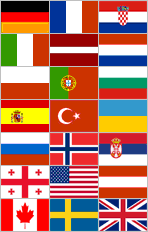Overview of dictionaries Lingvistica
develops for you: Details
|
Monolingual
dictionaries |
|
|
Frequency wordlists comprise word-forms arranged according to the frequencies of their occurrence in real-life texts, such as in the texts on web sites. Currently available... |
A sample of the Latvian frequency wordlist |
|
Lists of word forms comprise all morphological
forms of each word, with the corresponding grammatical data: part of speech
and subclass characteristics, such as gender, case, etc. An example is the
German word list. Each word-form has a reference to the initial form, the
lemma, thus making it possible to use such wordlists for efficient web
search. For example, searching for ‘Aal’ or ‘aalglatt’ in a search machine,
such as Google, the customer will automatically extend his/her search request
by adding to it all the morphological forms of the corresponding words: |
A sample of the German word forms |
|
Sound dictionaries are word lists along with
pronunciation of each word recorded in an mp3 file. |
A sample of the Spanish sound database |
|
Bilingual dictionaries |
|
|
The numerous bilingual dictionaries have either ‘plain’ entries, just
words / phrases and their translations, or, more often, the same and
morphological characteristics. In some of the dictionaries, the translations
are semantically differentiated, i.e. grouped according to the closeness of
their meanings. An example is the
English-Spanish dictionary. |
A sample of the English-Spanish bilingual dictionary |
Lingvistica is also a world renown developer of language software for:
automatic translation
language learning
word search, dictionary and phrasebook look-up
phonetic keyboard support
clipart presentation
Contact us:
in Canada phone +1 514 331 0172
e-mail: ling98@videotron.ca
in the Netherlands phone +31 162 313323
e-mail: info@vertaalbureau-dongen.nl

